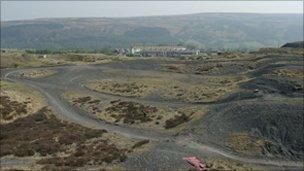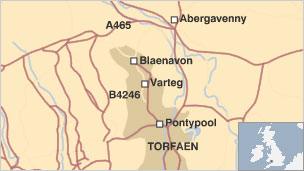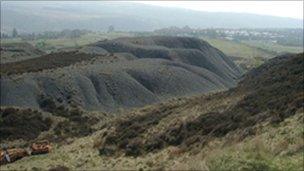Varteg Hill opencast mine bid rejected by councillors
- Published

The site, one of the highest points in Torfaen, is a former mining area
Controversial plans for an opencast mine on the edge of a world heritage site have been rejected.
Glamorgan Power wanted to extract 350,000 tonnes of coal from Varteg Hill, near Blaenavon, Torfaen.
But councillors refused the application at a meeting on Tuesday.
A Torfaen council spokesperson said the proposal "presented an unacceptable impact on local residents in relation to noise and dust."
Councillor Gwyneira Clark, executive member for planning, said: "Given the site's proximity to residential properties plus the nature, scale and duration of reclamation, this proposal presented an unacceptable impact on local residents in relation to noise and dust.
"The proposal is also considered to conflict with Welsh assembly policy which is why officers recommended refusal and why councillors voted against this in the council chamber."
Some villagers were worried about health effects on homes and a school, and up to 250 lorry round trips a week.
The application covered a 62-hectare (150 acre) site at Varteg Hill, west of Varteg village and about 1.5 miles south of Blaenavon.
Glamorgan Power proposed extracting between 2,000 and 2,500 tonnes of coal each week, using only mechanical means.
The 125 lorryloads would then be taken along the B4246, through Blaenavon towards the A465 Heads of the Valleys Road.
The coal would be taken from an 11.6-hectare (28 acre) area on the site. The firm has said the site would have a 10-year period of after care for landscaping.

The site is west of Varteg village, south of Blaenavon
A report that went before councillors at the extraordinary meeting on Tuesday noted that the highest point of a soil storage mound, up to 24m high, would come 110m behind some properties, while other homes would have the mound 60m from them.
Wildlife organisations and local people also objected strongly to the scheme.
Gwent Wildlife Trust said the area was the only known habitat of a species of lichen, as well as home to eight others considered nationally scarce.
The Reverend Priscilla Person, chair of governors at Ysgol Bryn Onnen and campaign secretary of the No Opencast Campaign, said in a statement on the school's website: "This will create a vast plume of dust and the school is less than 500 metres from the site.
"I am concerned about the impact this could have on our children's health."
Prior to the refusal, council officers concluded that the proposals contravened assembly government guidance that surface working of coal should not occur within 500m of a settlement and recommended that councillors refuse the application.

The company proposes a 10-year landscaping scheme after the coal is removed
Mining history in the area goes back to 1860, when the Varteg Hill Colliery opened and there was small-scale mining as recently as the 1990s.
In a report to councillors, Glamorgan Power argued that the proposal complied with the local development plan and "can make a significant contribution to the regeneration of the local area".
The report also said the applicant would pay £350,000 into a Neighbourhood Renewal Area scheme, with the money focused on properties within 500m of the site, and an extra sum of about £212,000 to be restricted to the 53 homes most likely to be affected.
The firm would also give land to the council for future environmental improvements.
Councillors were also told that Glamorgan Power believed its proposals could contribute to improvement plans by removing tips and creating a better environment.
The report said: "In relation to health and safety, the applicants point out that the tips are in close proximity to residential areas, and whilst dwellings are not at any risk of slippage the tips cannot be considered to be a safe amenity area".